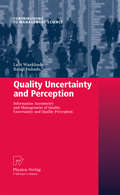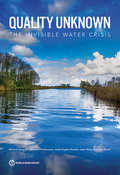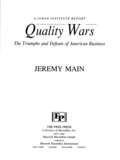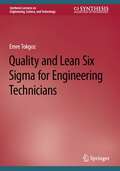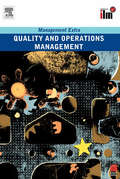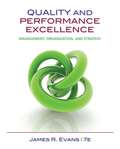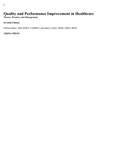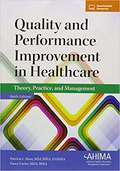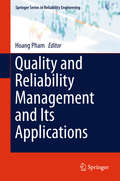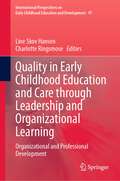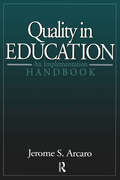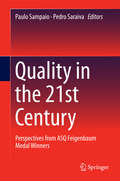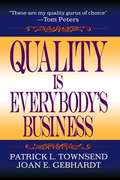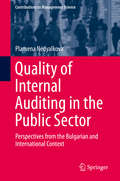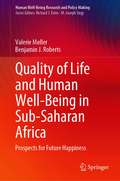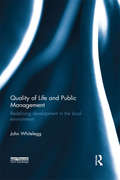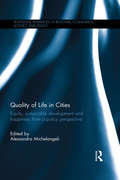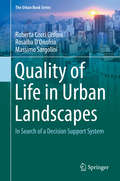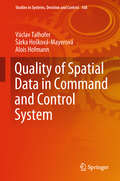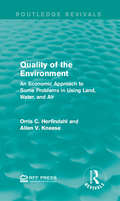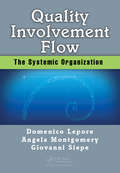- Table View
- List View
Quality Uncertainty and Perception
by Lalit Wankhade Balaji DabadeThe book addresses the complex issue of quality uncertainty due to information asymmetry in the backdrop of information economics, total quality management and marketing science. Reliability Engineering, Seven Management Tools and System Dynamics are used to develop theories on quality uncertainty and perception. Quality perception is identified as a multidisciplinary measure of business performance. The tools are developed to minimize quality uncertainty or to maximize quality perception. A few worksheets are provided for applying these theories to improve business performance.
Quality Unknown: The Invisible Water Crisis
by Richard Damania Sébastien Desbureaux Aude-Sophie Rodella RussWater quantity—too much in the case of floods, or too little in the case of droughts—grabs public attention and the media spotlight. Water quality—being predominantly invisible and hard to detect—goes largely unnoticed. Quality Unknown: The Invisible Water Crisis presents new evidence and new data that call urgent attention to the hidden dangers lying beneath water’s surface. It shows how poor water quality stalls economic progress, stymies human potential, and reduces food production. Quality Unknown examines the effects of water quality on economic growth and finds upstream pollution lowers growth in downstream regions. It reveals that some of the most ubiquitous contaminants in water, such as nitrates and salt, have impacts that are larger, deeper, and wider than has been acknowledged. And it traces the damage to crop yields and the stark implications for food security in affected regions. An important step toward tackling the world’s water quality challenge is recognizing its scale. The world needs reliable, accurate, and comprehensive information so that policy makers can have new insights, decision making can be evidence based, and citizens can call for action. The report calls for a paradigm shift that emphasizes safer, and often more cost-effective remedies that prevent pollution by combining smarter policies with newer technologies. A key message of Quality Unknown is that such solutions exist and change is possible.
Quality Wars: The Triumphs and Defeats of American Business
by Jeremy MainThe quality revolution in American industry, now more than a decade old, has produced an avalanche of books, but this is the first in-depth study reporting the struggles from inside the companies that have attempted large-scale improvement efforts. Jeremy Main has interviewed more than a dozen chief executives, all of whom have managed quality programs, including Charles Clough of Nashua, Robert Galvin of Motorola, James Hagen of Conrail, Roger Milliken of Milliken, Ray State of Analog Devices, and John Young of Hewlett-Packard, in addition to hundreds of other senior executives, workers, labor representatives, city officials, military officers, and hospital administrators. Through their experiences, Main reveals what works and what doesn't work when an organization attempts the transforming leap into Total Quality Management. Their message comes through loud and clear: it is a tough battle, but persistence can win priceless rewards. The notable successes at BancOne, L.L. Bean, Ford, Hewlett-Packard, Motorola, Saturn, Solectron, and Xerox prove it. However, Main shows that Motorola and Hewlett-Packard, among the earliest and best practitioners of total quality, are still finding obstacles to overcome. And some other early converts, such as Florida Power & Light, have stumbled badly along the way. Main's vivid descriptions of these setbacks capture the difficulties inherent in implementing a total quality system. His dramatic accounts of success and failure at companies such as Milliken and Intel convey valuable knowledge that is otherwise gained only by actual experience. The way to achieve the "new quality" of today, Main shows, is through a full commitment to TQM. He reveals through the experiences of these companies that TQM is not just a management tool, as it has often been used, but a management philosophy that is indispensable in attaining a high level of quality -- now a requisite for competing successfully. With the collaboration of the Juran Institute, Main demonstrates how TQM has transformed companies by improving quality at all levels. The accounts of these triumphs are direct evidence that world-class quality is attainable by American industry, and will inspire and point the way for executives, managers, and government officials in their timeless pursuit of total quality.
Quality and Lean Six Sigma for Engineering Technicians (Synthesis Lectures on Engineering, Science, and Technology)
by Emre TokgozThis textbook is the first of its kind, designed exclusively for the training and professional development of engineering technicians and technologists on the quality concepts, tools, and skills necessary for today's industrial environment. The book provides learners and working professionals with numerous examples, exercises, and case studies to prepare them to apply concepts including total quality management (TQM), six sigma, and lean methodology in analyzing and solving quality problems and implementing process improvements and corrective actions in the manufacturing process.Quality and Lean Six Sigma for Engineering Technicians gives readers a practical understanding of six sigma and manufacturing improvement concepts. It is also a go-to reference for practicing engineering technicians already working in the field.
Quality and Legitimacy of Global Governance
by Timothy CadmanSince the Rio 'Earth' Summit of 1992, sustainable development has become the major policy framework through which the international community deals with pressing environmental issues such as deforestation. Implicit in this approach is the belief that the market provides the best mechanism to bring government, business and society together, and a whole plethora of market-driven schemes have been developed in response. Yet how legitimate are these institutions, and where is their democratic accountability? This book looks at four institutions created to address forest management, namely the Forest Stewardship Council (non-governmental), the Programme for the Endorsement of Forest Certification (business), the ISO 14000 Series of environmental standards (technocratic), and the United Nations Forum on Forests (governmental). It finds large discrepancies in the approaches taken, and the degree to which the four systems provide for meaningful participation and productive deliberation amongst stakeholders trying to address the global forest crisis.
Quality and Operations Management Revised Edition: Revised Edition (Management Extra Ser.)
by ElearnManagement Extra brings all the best management thinking together in one package. The series fuses key ideas with applied activities to help managers examine and improve how they work in practice. Management Extra is an exciting, new approach to management development. The books provide the basis for self-paced learning at level 4/5. The flexible learning structure allows busy participants to study at their own convenience, minimising time away from the job. The programme allows trainers to quickly plan and deliver high quality, business-led courses. Trainers can select materials to meet the needs of their delegates, clients, and budget. Each book is divided into themes of ideal length for delivering in a training session. Each theme has a range of activities for delegates to complete, putting the training into context and relating it to their own situation and business. The books’ lively style will stimulate further interest in the subjects covered. Guides for further reading and valuable web references provide a lead-in to further research. Management Extra is based on the NVQ framework to ease the creation of Diploma, Post Graduate Diploma or NVQ programmes for managers. It is accredited with all leading awarding bodies.
Quality and Performance Excellence: Management, Organization, and Strategy (Seventh Edition)
by James R. EvansDelivering cutting-edge coverage that includes the latest thinking and practices from the field, QUALITY AND PERFORMANCE EXCELLENCE, 7th Edition presents the basic principles and tools associated with quality and performance excellence using relevant, real-world illustrations and examples. The text thoroughly illustrates how these basic principles and methods have been put into effect in a variety of organizations. It also illustrates the relationship between basic principles and the popular theories and models studied in management courses. Excellent case studies focus on large and small companies in manufacturing and service industries in North and South America, Europe, and Asia-Pacific.
Quality and Performance Improvement in Healthcare: Theory, Practice, and Management
by Patricia L. ShawYou will soon be entering your chosen profession in the healthcare field. The issues involved in the management of quality in healthcare span the various clinical and administrative disciplines and must be approached from a variety of perspectives. Many improvements for healthcare services are developed through team-based activities. Employers also will expect you to be able to apply performance improvement (PI) data analysis and presentation tools. Prepare now for the possibility that at some point in the future you will be asked to facilitate a PI team meeting.
Quality and Performance Improvement in Healthcare: Theory, Practice, and Management, Sixth Edition
by Darcy Carter Patricia L. Shaw MEd Rhia Fahima MhaThis text book from AHIMA presents a comprehensive introduction to the theory, practice, and management of performance and quality improvement processes in healthcare organizations.
Quality and Reliability Management and Its Applications
by Hoang PhamIntegrating development processes, policies, and reliability predictions from the beginning of the product development lifecycle to ensure high levels of product performance and safety, this book helps companies overcome the challenges posed by increasingly complex systems in today's competitive marketplace. Examining both research on and practical aspects of product quality and reliability management with an emphasis on applications, the book features contributions written by active researchers and/or experienced practitioners in the field, so as to effectively bridge the gap between theory and practice and address new research challenges in reliability and quality management in practice. Postgraduates, researchers and practitioners in the areas of reliability engineering and management, amongst others, will find the book to offer a state-of-the-art survey of quality and reliability management and practices.
Quality in Early Childhood Education and Care through Leadership and Organizational Learning: Organizational and Professional Development (International Perspectives on Early Childhood Education and Development #41)
by Charlotte Ringsmose Line Skov HansenThis book provides insights in to how high quality learning environments in Early Childhood Education and Care (ECEC) develop, and how competent systems can support this. It builds on the knowledge that quality early environments shape the wellbeing and development of the child, and explores how communities of professional practice that support quality development are built. Acknowledging that the conditions for providing high quality pedagogical work depend not only on the individual teacher, but also on collaboration and organizational and professional development. The book draws on a range of theoretical frameworks and research that underline competent systems rather than individualized learning as a path to improve workforce quality and professionalization in the field of ECEC.
Quality in Education: An Implementation Handbook
by Jerry ArcaroAlthough hundreds of school improvement programs have been launched in the United States over the past quarter century, very few of them have been successful. The author of Quality in Education: An Implementation Handbook, an experienced quality expert who specializes in education, believes that many of these programs could have succeeded had their developers understood and applied the theories and methods of Total Quality Management (TQM). This book explains how to avoid the pitfalls that doomed previous efforts to failure, and apply TQM to build a strong foundation for success.Beginning with the basic concepts and tools, this book is your complete guide as you embark on your quality journey. The handbook explains the importance of making a commitment to change and establishing a shared vision of quality, and discusses tools and techniques for overcoming resistance and developing a quality culture. The book covers new methods you can use to manage change, and includes exercises to help you apply the ideas in your organization. Examples from successful schools demonstrate how Total Quality Management can be applied to every area of education, from classroom management to building maintenance.Quality in Education: An Implementation Handbook teaches you how to make fundamental changes to the way people in your district or school view education and themselves as educators. Using the principles and methods in this book ,you can realize the tremendous benefits of quality - continuous improvement in every educational process.
Quality in the 21st Century
by Paulo Sampaio Pedro SaraivaThis book is a compilation of perspectives provided by several winners of the ASQ Feigenbaum Medal, which is awarded each year to an individual under the age of 35 who has made a significant contribution to the field of Quality. As such, it serves as a valuable reference book in this area. It is primarily based on the medalists' vision to "refresh" and "re-think" the quality concepts that have been used over the past century and the future development of the topic. Maximizing readers' understanding of the ways in which Quality is created, it provides insights from pioneers in this field from around the globe and anticipates how and what Quality will be in the future, as well as how people and organizations can benefit from it today.
Quality in the Development Process--Leveraging Knowledge in Chemical Synthesis
by Gary P. PisanoA challenge facing many companies is to create a development process that is fast, efficient, and capable of generating high-quality process designs. This chapter explores this important relationship between the development process and design quality.
Quality is Everybody's Business
by Patrick L. Townsend Joan E. GebhardtDone correctly, Total Quality Management (TQM) will increase your profits and preserve your resources, make your customers and employees happy, and it is the ethical thing to do. The key, of course, is to do it right. Unfortunately, when quality efforts fail to fulfill their potential, business leaders begin to doubt the efficacy of making the pursuit of quality a primary organizational priority.The most consistent mistake: starting small and implementing only part of the plan. Examples of partial efforts ending in disappointment or disaster abound. As a result, the only thing "total" about TQM processes has been the level of frustration. Quality is Everybody's Business makes it possible for people at all levels of your organization to understand the underlying theory and the specific mechanics of continual improvement.In an easy-to-read style, the book shows you how to untangle seemingly complex theory into guidelines for everyday managing and leading. The authors provide a comprehensive presentation of the practical details and the reasoning behind defining, implementing, and maintaining a 100% employee involvement process. Taken as a whole, the articles presented in this book address the theory and the practice of TQM in an integrated manner.Once your customers experience quality, they will continue to look for the quality option. Done correctly, TQM can be defined and implemented in six-to-eight months - and that includes actively involving everyone on the payroll in the process and seeing positive bottom line results virtually immediately. Whether your organization has a TQM process in place or is just beginning to implement one, Quality is Everybody's Business gives you the tools to make it a complete quality process.
Quality of Earnings Analysis
by David F. HawkinsDiscusses quality of earnings analysis and its relevance to security valuation.
Quality of Financial Sector Regulation and Supervision Around the World
by Alexander Tieman Martin ČihákA report from the International Monetary Fund.
Quality of Internal Auditing in the Public Sector: Perspectives from the Bulgarian and International Context (Contributions to Management Science)
by Plamena NedyalkovaThis book examines key methodological and organizational questions with regard to assessing the quality of internal audits. By studying the status quo of these audits in the public sector, including municipalities, it identifies relevant weaknesses, loopholes and issues. In addition, the book assesses the strengths and weaknesses of the approved control system to explain the reasons why, and conditions under which, internal audits are ineffective, and proposes new metric and non-metric indicators to improve the quality of internal auditing. Given its scope, the book offers a valuable guide for anyone responsible for financial controls and internal audits, and will appeal to students and financial practitioners alike.
Quality of Life and Human Well-Being in Sub-Saharan Africa: Prospects for Future Happiness (Human Well-Being Research and Policy Making)
by Valerie Møller Benjamin J. RobertsThis volume presents an account of how people in sub-Saharan Africa have fared under changing life circumstances of the past centuries until the present. By introducing the geography of the region it traces a time line of different historical periods that have shaped livelihoods of ordinary people of the region, and addresses the major milestones in political and economic development. It focuses on social indicators pointing to significant changes that have affected the health, education and wealth of sub-Saharan Africans and their outlook on the future since the wind of change blew through the region. With case studies and vignettes the book highlights how individual citizens across the 44 different countries of sub-Saharan Africa experience well-being and express their aspirations for the future. This book provides relevant material for practitioners and policy makers, including community and development workers, in non-governmental and other organizations in sub-Saharan African countries.
Quality of Life and Public Management: Redefining Development in the Local Environment
by John WhiteleggQuality of Life and Public Management explores the possibility for a dramatic and significant improvement in quality of life for all population groups and sub-groups in the UK. Strongly evidence-based, the book draws on case study data and comparisons into local and central government structure, funding, policy, cultures and outcomes from a number of EU countries, such as Denmark, Germany, and Switzerland. It shows that quality of life on a number of important criteria is superior in these other countries than it is in the UK. The book makes a strong argument that it is possible to replicate this success in the UK and that failure to do so has been the result of failed political institutions, in particular local government. John Whitelegg examines the impact of better central and local governance on the welfare of children and older people. He also looks at the built environment, air quality, resilience and renewable energy in the UK and gives suggestions for practical and implementable policies based on evidence and best practice from other EU cities. The book is rooted in the belief that every locality can and should have the best possible standards of health, quality of life, environment, climate change protection and transport choices that can be found anywhere in the world. This book will be of great value to students and researchers in the fields of public management, politics, social work, planning and public services in general. It also has direct relevance for professionals in central and local government, councillors, community groups and NGOs.
Quality of Life in Cities: Equity, Sustainable Development and Happiness from a Policy Perspective (Routledge Advances in Regional Economics, Science and Policy)
by Alessandra MichelangeliIn the last few decades, urban quality of life has received increasing interest from policy makers who aim to make cities better places to live. In addition to the aim of improving quality of life, sustainable and equitable development is also often included in the policy agendas of decision makers. This book aims to link quality of life to related issues such as sustainability, equity, and subjective well-being. While less than one-third of the world's population lived in cities in 1950, about two thirds of humanity is expected to live in urban areas by 2030. This dramatic increase in the number of people living in urban areas serves as the backdrop for this book’s analysis of cities. This book will be useful to students and researchers in economics, architecture and urban planning, sociology and political sciences, as well as policy makers.
Quality of Life in Urban Landscapes: In Search Of A Decision Support System (The Urban Book Series)
by Roberta Cocci Grifoni Rosalba D'Onofrio Massimo SargoliniThis volume introduces an innovative tool for the development of sustainable cities and the promotion of the quality of life of city inhabitants. It presents a decision-support system to orient public administrations in identifying development scenarios for sustainable urban and territorial transformations. The authors have split the volume into five parts, which respectively describe the theoretical basis of the book, the policies in question and indicators that influence them, the decision-support system that connects indicators to policies, the case study of Ancona, Italy, and potential future directions for this work. This volume is based on transdisciplinary research completed in May 2016 that involved about 40 researchers at The University of Camerino, Italy and other European universities. With purchase of this book, readers will also have access to Electronic Supplementary Material that contains a database with groups of indicators of assessment of urban quality of life and a toolkit containing the data processing system and management information system used in the book's case study.
Quality of Spatial Data in Command and Control System (Studies in Systems, Decision and Control #168)
by Šárka Hošková-Mayerová Václav Talhofer Alois HofmannThis monograph aims to familiarize readers with the problem of evaluating the quality and reliability of digital geographic information in terms of their use. It identifies the key requirements for the functionality of this information and describes the system of evaluating its quality and reliability. The whole text is supplemented by examples that document the impact of different quality of the information on the entire decision-making process in command and control systems at the rescue and military levels.The monograph is primarily intended for professionals who are responsible for the implementation of digital geographic information in command and control systems, or for those who use them in their work. For this reason, particular attention is paid especially to the user aspects of the digital geographic information used.Václav Talhofer is Full Professor of Cartography and Geoinformatics at the University of Defense in Brno, Czech Republic.Šárka Hošková-Mayerová is Associate Professor of Mathematics at the University of Defense in Brno, Czech Republic.Alois Hofmann is a teacher and scientist of Cartography and Geoinformatics at the University of Defense in Brno, Czech Republic.All authors contributing to this book have been extensively studying the methods and procedures for the use of digital geographic information, especially in the environment of the Czech Armed Forces.
Quality of the Environment: An Economic Approach to Some Problems in Using Land, Water, and Air (Routledge Revivals)
by Allen V. Kneese Orris C. HerfindahlContemporary society is dependent on man’s ability to work fundamental changes in the natural environment. In using resources to produce high and rising levels of income, however, effects are often produced that are incidental to the main purpose. This study, first published in 1965, explores some research approaches to the economic analysis of some of the key environmental problems, including water and air pollution, the introduction of chemical substances into the environment and the development of urban and rural space. This title will be of interest to students of environmental studies and economics.
Quality, Involvement, Flow: The Systemic Organization
by Domenico Lepore Angela Montgomery Giovanni SiepeCurrent organizations underperform due to silo thinking. Artificial barriers frustrate efforts and perpetuate an organizational model no longer adequate for the complexity of the current business world. Leaders and managers must acquire a whole-system perspective for their organizations to be sustainable. This book provides the overview, knowledge and tools to create a practical shift for 21st century management. The “Theory of everything” for management; an evolved and more scientific Fifth Discipline plus field book for contemporary managers. It follows on from Deming and Goldratt: The Decalogue that continues to sell today and is based on over ten years of implementation.
